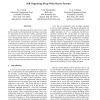Free Online Productivity Tools
i2Speak
i2Symbol
i2OCR
iTex2Img
iWeb2Print
iWeb2Shot
i2Type
iPdf2Split
iPdf2Merge
i2Bopomofo
i2Arabic
i2Style
i2Image
i2PDF
iLatex2Rtf
Sci2ools
100
click to vote
SASO
2008
IEEE
2008
IEEE
Self-Organizing Sleep-Wake Sensor Systems
We propose a self-organizing sleep-wake sensor system that is scalable, easily implemented, and energy conserving. An application of concepts from cellular automata theory accounts for much of its novelty. As a surprising byproduct of its self-organizing behavior, the system has additional, highly desirable properties such as a self-healing capability, fault tolerance, asynchronous operation, seamless accommodation of obstacles in the sensor field, and effectiveness even in the case of intelligent intruders who know sensor design and sensor locations. System performance is a focus of the paper, along with the inverse problem of cellular automata, and self-organizing systems in general: How does one set local rules and initial states so as to achieve pre-specified behavior? Our experimental studies show that broad classes of behavior can be achieved by design, especially by the placement of artificial nucleation centers.
Cellular Automata | Cellular Automata Theory | SASO 2008 | Self-organizing Sleep-wake Sensor | Self-Organizing Systems |
Related Content
| Added | 01 Jun 2010 |
| Updated | 01 Jun 2010 |
| Type | Conference |
| Year | 2008 |
| Where | SASO |
| Authors | Kyung Joon Kwak, Yuliy M. Baryshnikov, Edward G. Coffman Jr. |
Comments (0)

